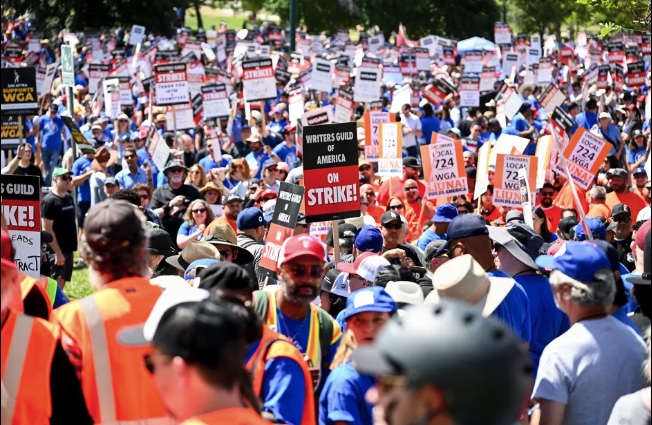
Eden Havel | Newsroom Manager & Brianna Hernandez | Writer
August 28, 2023
Since the cancellation and postponement of television and movie productions, it is unknown when our favorite shows and films will return. Your favorite television shows and movies aren’t premiering because of the Writer’s Strike. A protest created by screenwriters and actors has been active since May 2nd due to unfair pay, the threat of artificial intelligence, and the insecurity of contracts. Major film production companies like Netflix, Amazon, Sony, and Paramount provide unequal wages for their employees and have threatened to replace them with technology.
Currently, actors, screenwriters, and many individuals are protesting against the injustice, trying to fix this issue to deliver the best film productions to the public. It’s been going on for months, so it’s been taking a long time to convince. How much longer will it take them to get what they want? What is the future of entertainment?
As of now, the Writers Strike has been operating for four months. Multiple people worldwide are protesting, especially in Hollywood, California, where the most successful production companies reside. The Los Angeles streets are filled almost daily with hundreds of protesters enraged by film production companies. They consist of writers, producers, supporters, and well-known actors, including Anne Hathaway, Dakota Fanning, Jason Sudeikis, Kristen Wiig, and more. Multiple actors have called out production companies for the unfair pay they’d received in the past.
Christian Bale (American Psycho) spoke out about being underpaid for the lead role in the film, claiming that he was paid “the minimum wage at the time” and that his salary was so poor that his makeup artists made fun of him for making less than they did. Along with Bale, multiple other actors, including Ryan Gosling and Jennifer Lawrence, have spoken about underpayment for breakthrough films. Who knows how long it will take to receive justice over this issue, but a passionate community is doing all it can to create fair change.
“It’s frustrating that they underpay people just because they’re not big names yet, which makes them ‘not a threat,’” said sophomore Julie Bowen. “It shows how much greed these corporations have when it comes to the faces of their movies, and everyone else is the last priority.”
You might wonder why everyone is so bothered and worried about this issue. There have been many changes in the film industry ever since the strike began. Our favorite TV shows and movies aren’t premiering, and the strike brings along conditions: screenwriters refuse to write scripts, and actors refuse to act. This means that the creation of many productions has been paused until everyone is paid fairly.
Screenwriters cannot discuss projects with other filmmakers. Actors cannot take on auditions or participate in any acting job. In this case, many participants are currently unemployed—unable to promote their work or any project they are a part of. Until people working in the film industry stop empowering the corporations and start speaking out for justice on the issue, our entertainment is on hold. The goal is not only to irritate the studios but the whole world as well. The film dramatically impacts the public, and losing the ability to enjoy it creates a dilemma.

“I’ve noticed that many of my favorite shows have been shut down all summer,” commented junior Micah Davis. “I’m just waiting for them to return, and I think everybody is. I hope it doesn’t take much longer because everybody wants things to continue with a solid agreement.”
So what is the future of the Writers’ Strike? What does the future hold for audiences? This is not the first time that Writers’ Strikes have occurred in the past, the longest having reached 153 days. But this Writers’ Strike is most concerned with the future of the industry rather than the present. While streaming services and AI can enrich the world of movies and television, they also threaten the well-being, privacy, income, and contracts of writers, actors, make-up artists, stunt doubles, and many more.
Along with the WGA (for screenwriters) and the SAG-AFTRA (actors and voice actors) unions, the DGA (for Hollywood directors) will likely also join the union as their creativity becomes threatened. This could mean a mega strike and an entire shutdown of Hollywood. But for now, things are stalemate, and neither side is willing to settle its terms. At the moment there is no end in sight for this ongoing battle, with the hope remaining that perhaps this conflict will create a more creative future with justice for all sides.

Leave a Reply